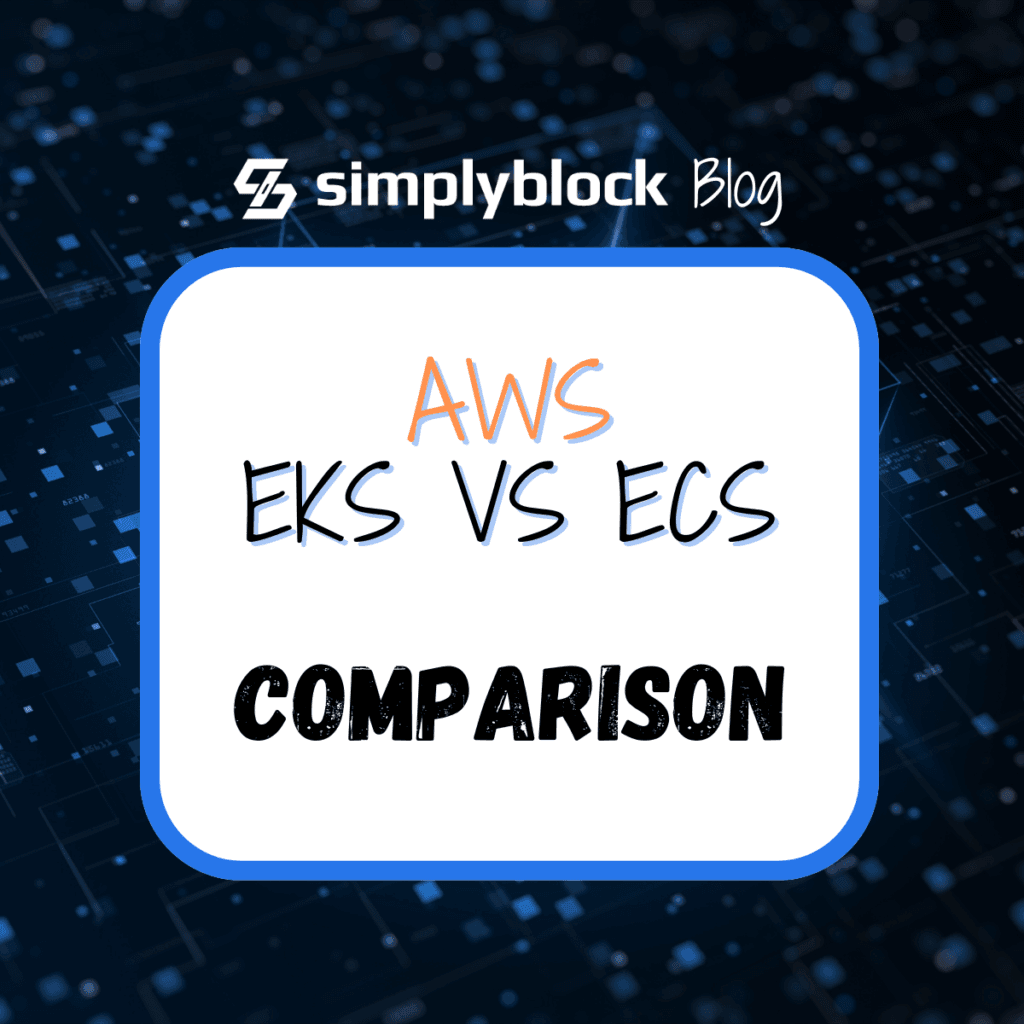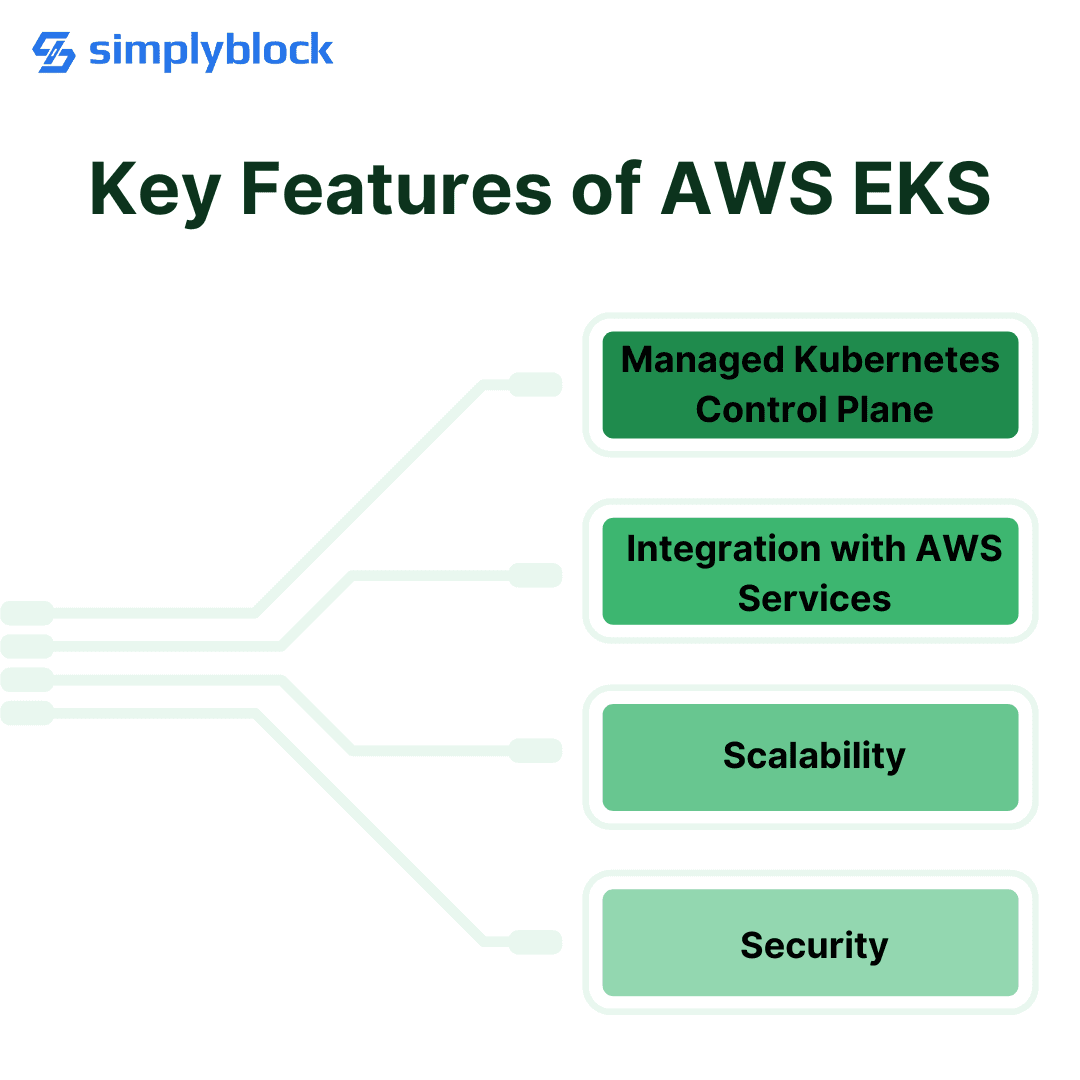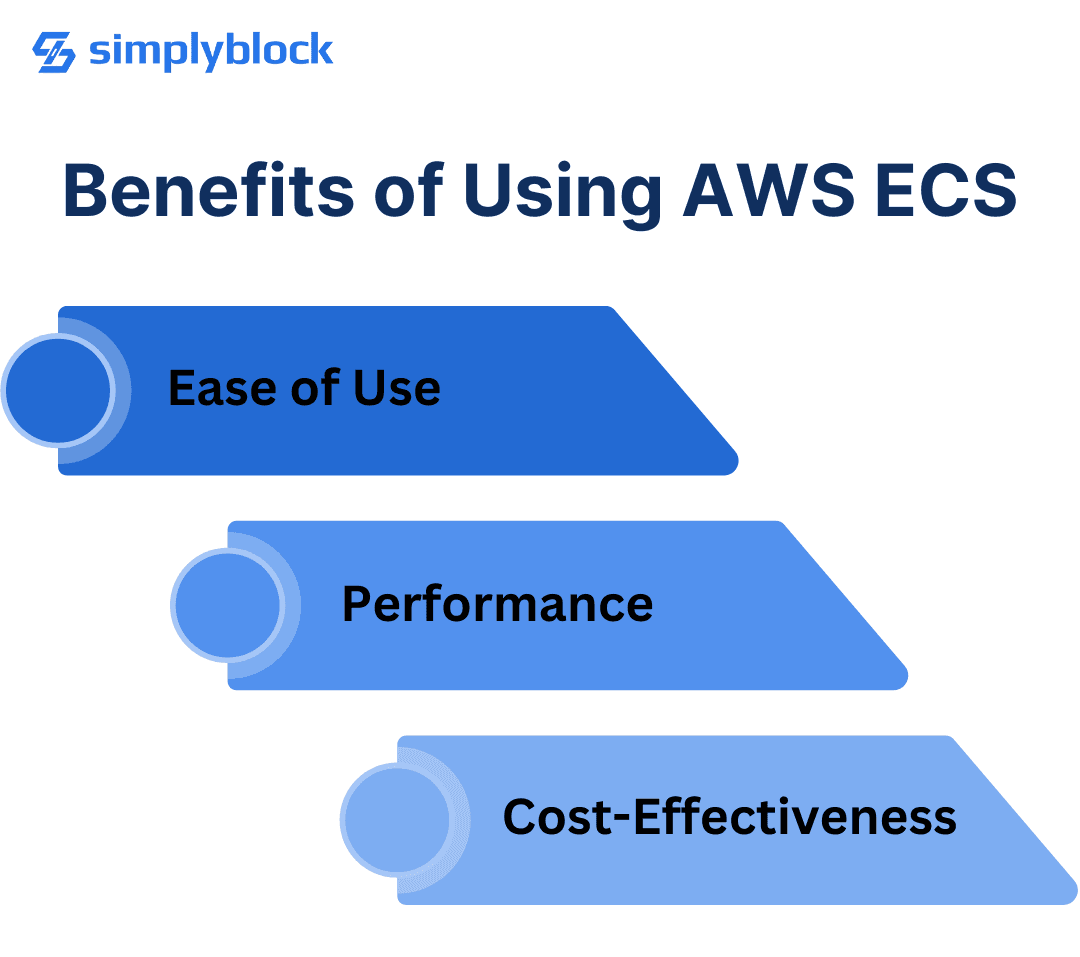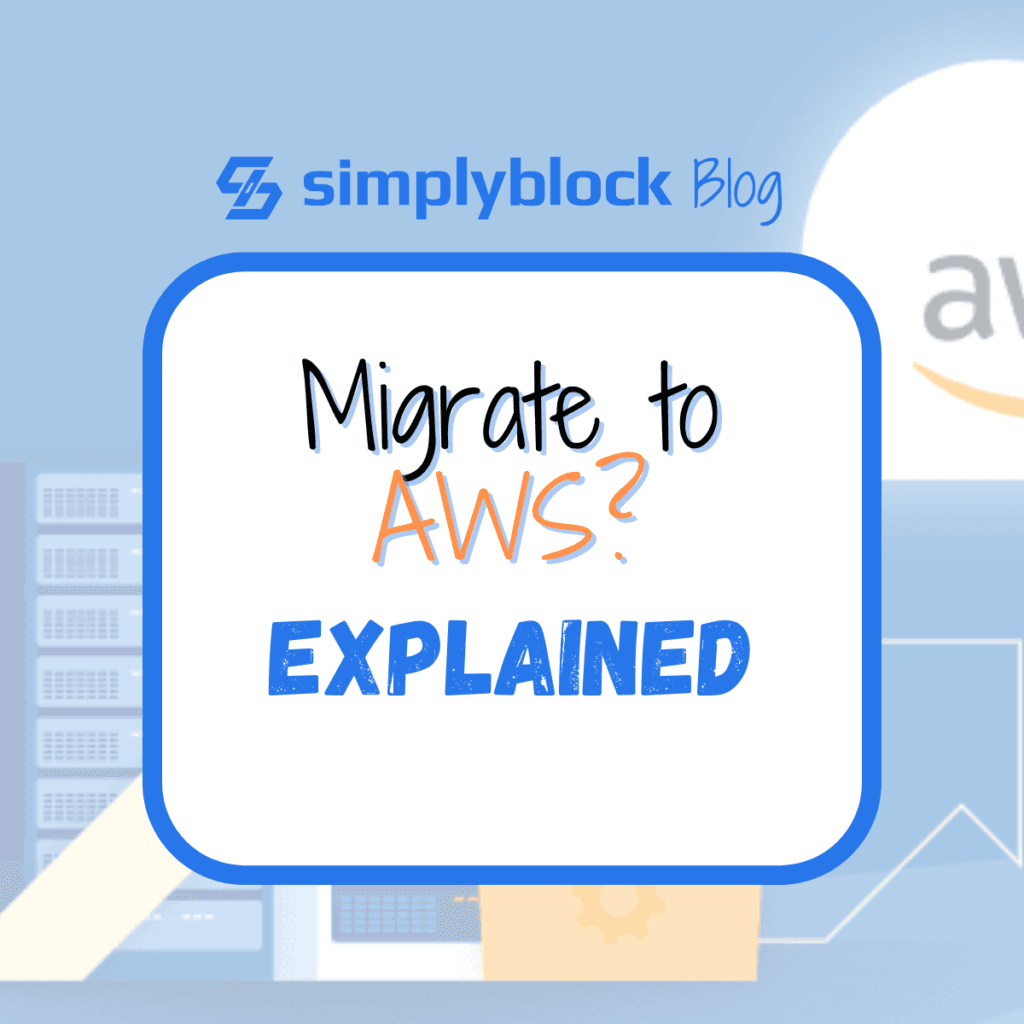Amazon EKS vs. ECS: Understanding the Differences and Choosing the Right Service
Sep 06th, 2024 | 7 min read

Table Of Contents
- Introduction
- Understanding AWS' Amazon EKS
- Understanding Amazon ECS
- Comparing AWS EKS and ECS
- Use Cases for Amazon EKS
- Use Cases for Amazon ECS
- Integration with other AWS Services
- Developer and Operations Experience
- Community and Support
- Case Studies
- Conclusion
- Frequently Asked Questions (FAQs)
- How can Simplyblock Enhance your AWS EKS or ECS Deployments?
Introduction
When it comes to container orchestration on AWS, two primary services come to mind: Amazon Elastic Kubernetes Service (EKS) and Amazon Elastic Container Service (ECS) . Both offer robust solutions for deploying, managing, and scaling containerized applications, but each has its unique strengths and ideal use cases. Choosing the right service is crucial for optimizing performance, cost, and management efficiency.
Understanding AWS’ Amazon EKS
Overview of AWS EKS
Amazon EKS is AWS’ managed Kubernetes service, which simplifies running Kubernetes on AWS without the need to install and operate your own Kubernetes control plane or worker nodes. Kubernetes, an open-source container orchestration platform, automates the deployment, scaling, and operation of application containers.
Key Features of AWS EKS
Managed Kubernetes Control Plane : AWS handles the control plane management, ensuring high availability and security.
Integration with AWS Services : Seamless integration with other AWS services such as IAM, VPC, and CloudWatch.
Scalability : Supports both horizontal and vertical scaling, making it suitable for varying workload demands.
Security : Provides features like IAM roles for service accounts, enabling granular access control.
Benefits of using AWS EKS
Simplified Kubernetes Management : Reduces the operational burden of managing Kubernetes clusters.
Flexibility : Offers the flexibility to run Kubernetes-native applications and leverage the Kubernetes ecosystem.
High Availability : Ensures your control plane is spread across multiple AWS Availability Zones.
Understanding Amazon ECS
Overview of Amazon ECS
Amazon ECS is AWS’ native container orchestration service that supports Docker containers and allows you to run applications on a managed cluster of Amazon EC2 instances. It provides a highly scalable, high-performance orchestration service deeply integrated with the AWS ecosystem.
Key Features of AWS ECS
Native AWS Integration : Deep integration with AWS services like IAM, CloudWatch, and AWS Fargate.
Task Definitions : Define containers and their configurations through JSON task definition files.
Service Management : Allows you to maintain application availability and enables service discovery.
Benefits of using AWS ECS
Ease of Use : Simplifies the process of running and managing Docker containers.
Performance : Optimized for performance within the AWS ecosystem .
Cost-Effectiveness : Can be more cost-effective due to its integration with AWS services and straightforward pricing.
Comparing AWS EKS and ECS
Architecture – Kubernetes Vs. Native AWS:
EKS : Provides Kubernetes, an open-source platform, offering flexibility and a wide range of capabilities.
ECS : A native AWS service designed for seamless integration with other AWS offerings and hiding the complexity of managing a Kubernetes-alike infrastructure.
Deployment and Management – Complexity and Learning Curve:
EKS : Requires understanding of Kubernetes concepts, which might be more challenging for some teams.
ECS* : Easier to set up and manage, especially for users familiar with AWS.
Performance – Scalability and Efficiency:
EKS : Supports Kubernetes-native scaling solutions. ECS : Offers native scaling within AWS, including integration with AWS Auto Scaling.
Pricing Models:
EKS : Charges for the Kubernetes control plane and the compute resources (EC2 or Fargate).
ECS : No control plane costs; you pay only for the underlying compute resources.
Customization and Configurability:
EKS : Highly customizable through Kubernetes tools and extensions. ECS : Integrates well with AWS services but is little flexibility with third-party tools.
Security Features and Compliance:
Both : Offer strong security features like IAM roles and VPC integration. EKS : Additional security configurations specific to Kubernetes, like network policies.
Use Cases for Amazon EKS
When to Choose Amazon EKS
EKS is ideal for organizations already invested in Kubernetes or those requiring extensive customization and flexibility. It’s suitable for complex applications that benefit from the Kubernetes ecosystem.
Example Scenarios and Applications
Microservices Architectures : Leveraging Kubernetes’ robust orchestration capabilities.
Hybrid Deployments : Integrating on-premises Kubernetes clusters with cloud-based clusters.
Use Cases for Amazon ECS
When to Choose Amazon ECS
ECS is perfect for users seeking simplicity and tight integration with AWS services. It’s a great choice for straightforward containerized applications that don’t require extensive third-party integrations.
Example Scenarios and Applications
Batch Processing : Running large-scale batch processing tasks efficiently.
Web Applications : Deploying and managing web applications with minimal overhead.

Integration with other AWS Services
How EKS Integrates with other AWS Services
EKS integrates seamlessly with services like IAM for access control, CloudWatch for logging and monitoring, and ELB for load balancing.
How ECS Integrates with other AWS Services
ECS offers deep integration with AWS services such as IAM, CloudWatch, and AWS Fargate, providing a cohesive environment for container management.
Developer and Operations Experience
Ease of Use for Developers: EKS might require more setup and configuration due to Kubernetes’ complexity. ECS offers a more straightforward experience, especially for developers familiar with AWS.
Operations and Maintenance Considerations: EKS requires managing Kubernetes updates and configurations, while ECS offloads much of this operational overhead to AWS, simplifying maintenance.
Community and Support
Community Support for EKS: EKS benefits from the extensive Kubernetes community, providing numerous resources, plugins, and tools.
Community Support for ECS: ECS has strong support within the AWS community, with extensive documentation and integration guides.
AWS Support and Documentation Both services offer comprehensive AWS support and documentation, ensuring users can find the help they need.
Case Studies
Companies using AWS EKS
Snap Inc. : Utilizes EKS for scalable, reliable infrastructure. Intuit : Leverages EKS for Kubernetes-based application deployments.
Companies using AWS ECS
Samsung : Uses ECS for efficient container management. GE (General Electric) : Employs ECS for scalable, containerized applications.

Conclusion
Choosing between the AWS’ services Amazon EKS and Amazon ECS depends on your specific needs and expertise. EKS offers greater flexibility and integration with Kubernetes’ extensive ecosystem, making it ideal for complex applications. ECS provides a simpler, more integrated experience within the AWS ecosystem, suitable for straightforward containerized applications.
Save up to 80% on Amazon EBS Costs simplyblock can help you reduce your Amazon EBS storage costs by up to 80% through high-performance cloud block storage and seamless integration with local NVMe, EBS, and S3.
Frequently Asked Questions (FAQs)
What are the Main Differences between Amazon EKS and ECS?
AWS EKS uses Kubernetes, providing extensive customization and flexibility, while ECS is a native AWS service offering simpler management and tighter AWS integration.
Which Service is more Cost-effective?
ECS can be more cost-effective due to its straightforward pricing model, whereas EKS involves additional costs for the Kubernetes control plane.
Can i Migrate from ECS to EKS Easily?
Migrating from ECS to EKS can be complex due to the differences in orchestration and management, but AWS provides tools and documentation to facilitate the process.
Is EKS better for Large-scale Applications?
EKS is often better for large-scale applications requiring extensive customization and flexibility, leveraging Kubernetes’ capabilities.
How does AWS Support Differ for EKS and ECS?
Both services offer robust AWS support and documentation, with EKS benefiting from the broader Kubernetes community and ECS from the AWS community.
How can Simplyblock Enhance your AWS EKS or ECS Deployments?
AWS Marketplace storage solutions, Such as Simplyblock can help reduce your database costs on AWS by up to 80%. Simplyblock offers high-performance cloud block storage that enhances the performance of your databases and applications. As part of an AWS migration strategy, Simplyblock ensures you get better value and efficiency from your cloud resources.s.
Simplyblock software provides a seamless bridge between local NVMe disk, Amazon EBS, and Amazon S3, integrating these storage options into a single, cohesive system designed for the ultimate scale and performance of IO-intensive stateful workloads. By combining the high performance of local NVMe storage with the reliability and cost-efficiency of EBS (gp2 and gp3 volumes) and S3 respectively, simplyblock enables enterprises to optimize their storage infrastructure for stateful applications, ensuring scalability, cost savings, and enhanced performance. With simplyblock, you can save up to 80% on your EBS costs on AWS.
Our technology uses NVMe over TCP for minimal access latency, high IOPS/GB, and efficient CPU core utilization, outperforming local NVMe disks and Amazon EBS in cost/performance ratio at scale . Ideal for high-performance Kubernetes environments, simplyblock combines the benefits of local-like latency with the scalability and flexibility necessary for dynamic AWS EKS deployments , ensuring optimal performance for I/O-sensitive workloads like databases. By using erasure coding (a better RAID) instead of replicas, simplyblock minimizes storage overhead while maintaining data safety and fault tolerance. This approach reduces storage costs without compromising reliability.
Simplyblock also includes additional features such as instant snapshots (full and incremental), copy-on-write clones, thin provisioning, compression, encryption, and many more – in short, there are many ways in which simplyblock can help you optimize your cloud costs. Get started using simplyblock right now and see how simplyblock can help you on the AWS Marketplace. Simplyblock is available on AWS marketplace .



